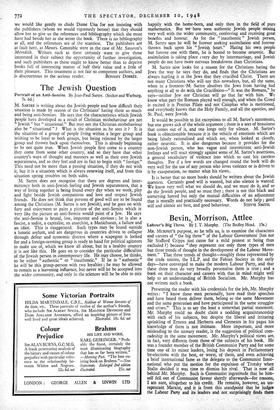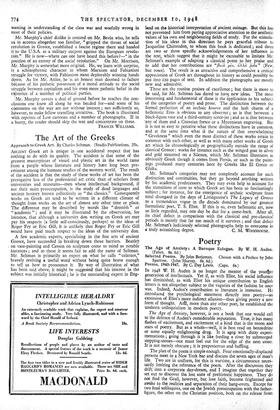Bevin, Morrison, Attlee
Labour's Big Three. - By J. T. Murphy. (The Bodley Head. 15s.)
MR. MURPHY'S purpose, so he tells us, is to examine the characters and careers of " the big three " of the Labour Government (has not Sir Stafford Cripps just cause for a mild protest at being thus excluded ?) because "they represent not only three types of men but three trends of thought in the development of the Labour Move- ment." That three trends of thought—roughly those represented by the trade unions, the I.L.P. and the Fabian Society in the early days—have converged to make the modern Labour Party, and that these three men do very broadly personalise them is true ; and a book on their character and careers with that in mind might well help to an understanding of -British Socialism. Mr: Murphy has not written such a book.
Presenting the reader with his credentials for the job, Mr, Murphy writes : " I know these men personally, have read their speeches and have heard them deliver them, belong• to the same Movement and the same generation and have participated in the same struggles and crises." This is to-say the least a somewhat partial statement. Mr. Murphy could no doubt claim a nodding acquaintanceship with each of his subjects, but despite the liberal and irritating sprinkling of Ernests and Herberts and Clements in his pages his knowledge of them is not intimate. More important, and more misleading to the unwary reader, is the suggestion of political com- radeship in the same movement. Mr. Murphy's political views are, in fact, very different 'from those of 'the subjects of his book. He was'a founder member of the British Communist Party and for some time one of its minor leaders, losing his deposit in Parliamentary by-elections with the best, or worst, of them, and even achieving a brief international fame as the delegate to the Communist Inter- national who put the motion for the expulsion of Trotsky when Stalin decided it was time to dismiss his rival. That is now all behind Mr. Murphy. Such is Communist ingratitude that he him- self fell out of Communist favour shortly afterwards--for reasons, I am sure, altogether to his credit. He remains, however, an un- repentant Marxist, and it is from this standpoint that he judges the. Labour Party and its leaders and not surprisingly finds them
wanting in understanding of the class war and woefully wrong in most of their policies.
Mr. Murphy's chief dislike is centred,on Mr. Bevin who, he tells us in accents altogether too familiar "gripped the throat of social revolution in Greece, established a fascist regime there and handed it to the U.S.A. as a military outpost against the European revolu- tion." He is now—where can one have heard this before?—" in the p!ssitlon of an enemy of the social revolution." On Mr. Morrison, Mr. Murphy is somewhat more original. He, we learn with surprise, is. a schizophrenic -character in whom Marxism and Fabianism struggle for victory, with Fabianism most deplorably winning hands down. As for Mr. Attlee, he is an honest man doomed to failure because of his pathetic possession of a moral attitude to the social struggle between capitalism and his even more pathetic belief in the eiristence of a number of political pirties.
:Mr. Murphy covers a deal of ground before he reaches the con- clusions one knew all along he was headed for—and some of his comments on the way are not without-interest ; not sufficiently so, h6wever, to make fellow travelling attractive. The book is illustrated with reprints of Low cartoons and a number of photographs. If in a 'hurry, the reader should skip the text and concentrate on these.
FRANCIS WriLiams.















































 Previous page
Previous page